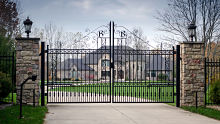
With 70% of inherited wealth lost by the second generation and 90% of it lost by the third generation, young adults who are in line for an inheritance need a better understanding of what it takes to be a successful investor, according to Michael Lee-Chin, chairman and president of Burlington, Ont.-based Portland Holdings Inc., at a discussion in Toronto on Thursday.
“We must teach our children how wealth is created,” Lee-Chin told a large audience of young business students and financial services sector veterans at the University of Toronto’s Rotman School of Management.
During his talk, entitled “The Wealthy Invest Differently: Opportunities Typically Reserved for the Affluent and Institutional Investor,” Lee-Chin explained his framework, which he researched personally, that describes the decisions affluent investors make to separate them from the masses.
Lee-Chin developed the framework in the late 1970s when he began his career in financial services as a mutual fund advisor. He wanted to know how to provide the highest value-added service for his clients, he said.
The answer was to make those families wealthy, and so he began researching the common thread between people who created their own wealth. He found that wealthy people were looking for opportunities not typically found in the average mutual fund.
For one, the wealthy own a few high-quality businesses and have a deep understanding of those companies, as opposed to owning 100 or more businesses, as is often the case with mutual funds.
People cannot truly understand the qualities of so many companies, Lee-Chin told the audience.
Wealthy people also invest in companies that are in industries with long-term growth prospects and retain holdings in those companies for a long period of time. In addition, affluent investors look for companies that use people’s money prudently.
“If you own 100 different businesses, are you sure you have 100 crackerjack [chief financial officers]?” Lee-Chin asked.
Lee-Chin also encouraged the audience to seek private companies when composing their investment portfolios, saying that successful investors will own a mix of private and public holdings. On the other hand, most investors depend on publicly traded securities for their wealth.
Privately owned and publicly owned businesses are managed differently and the characteristics of those private companies will pull clients forward, according to Lee-Chin.
Publicly traded companies use democratic processes governed by independent boards of directors, which focus on issues such as risk, compliance and quarterly targets, Lee-Chin explained.
In contrast, the owners of private companies are autocratic individuals who control the decision-making process, which is more concentrated on producing long-term growth and not necessarily short-term financial results.
“Would you [as a business owner] nominate six other directors, each of whom has a similar number of votes to you, and none of whom has any skin in the game?” asked Lee-Chin of the audience.
Thus, the next generation of investors must be either willing to invest in private companies or look for publicly traded companies that have the entrepreneurial characteristics of private companies, Lee-Chin said.